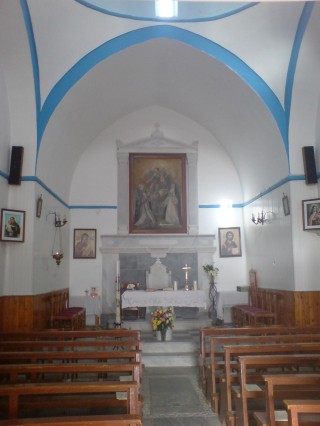 This is a rather less exalted posting than the last one about Mykonos.
This is a rather less exalted posting than the last one about Mykonos.
Mykonos must be the original of Through the Looking-Glass. Whatever direction you set out in, you end up somewhere else. What is particularly impressive is that in one place, after walking uphill for 10 minutes from the harbour, you end up at the water’s edge. Surreal.
This time I got a map, and asked, and made a dry run; but nevertheless at the last minute I rushed back to my excellent hotel to get a bundle of old drachma notes to put in the collection (if the Church can’t turn those into money, I thought, no-one can) and I took a wrong turning and I was a good ten minutes late for the 7.30pm Mass. Not to worry: the Mass itself was also late and hadn’t yet started.
At the beginning of June the tourist season in Mykonos hasn’t really got under way – the roads are empty and the beaches are half deserted – so the tiny church was full but not overflowing.
We were given a novel kind of missal as we went in. It was in eight languages, and done in parallel, so that each double-page spread had eight boxes of text, one for each language. The bishops who have responsibility for the Greek islands realise that in summer their churches become little towers of Babel, and have imaginatively designed this book to help everyone cope. It works very well.
The people’s parts of the Mass were done in Latin, because that was likeliest to be the language we all had in common. The variable prayers were done in Greek. The non-Gospel readings were done twice over, once in Greek and once in English. The Gospel was in Greek only, but we had all been given sheets with the readings in our own language (English, Spanish, etc) so that we could all follow.
The homily was in Italian, and the priest paused every few sentences so that one of the congregation – a person from Philadephia whom I loathed on sight for reasons I shan’t go into here – could translate into English. The same sort of thing happened whenever the priest wanted to give us instructions or exhortation during the Mass.
Deepening my devotions, or distracting from them (it’s hard to tell which) was the eighth language in the missal. Latin, Greek, English, Spanish, Polish – all those were straightforward, but what was this thing called “Shqip”? I spent a long time reading the Creed and the Eucharistic Prayer in it, looking for the words for “Lord”, “Father”, and so on, but coming to no conclusion at all.
At the end of Mass various things became clear. There is no resident priest on the island (at this time of year, anyway), so the priest’s next journey was to the ferry terminal. Shqip is the Albanian name for the Albanian language, which shows that there are enough Albanian migrants, and enough of them are Catholics, for the Greek bishops to pay attention to them and care for their needs.
And the priest who was equally fluent in Latin, Greek and Italian was, of course, a Pole.
 This is a technical posting of no interest to most users of Universalis, but I’ve put it here because it addresses a problem that has been repeatedly raised in Internet forums. Users of the downloadable Universalis for Windows Mobile have asked about it a couple of times, as well.
This is a technical posting of no interest to most users of Universalis, but I’ve put it here because it addresses a problem that has been repeatedly raised in Internet forums. Users of the downloadable Universalis for Windows Mobile have asked about it a couple of times, as well.